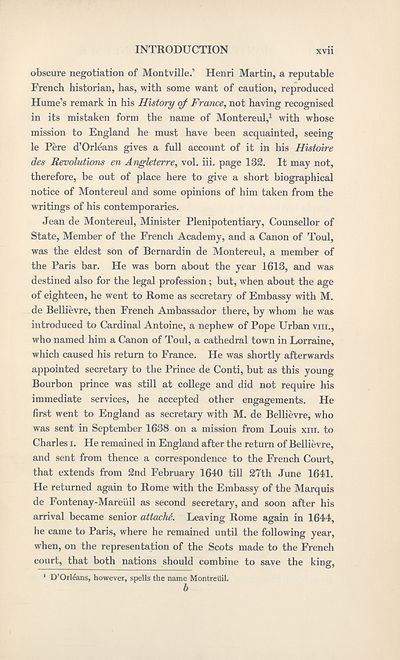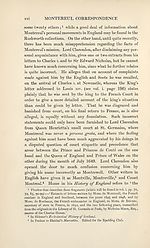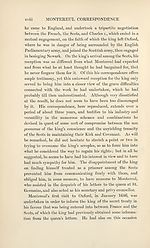Series 1 > Diplomatic correspondence of Jean de Montereul and the brothers de Bellièvre, French ambassadors in England and Scotland, 1645-48 > Volume 1
(22) Page xvii
Download files
Complete book:
Individual page:
Thumbnail gallery: Grid view | List view

INTRODUCTION
xvii
obscure negotiation of Montville.’ Henri Martin, a reputable
French historian, has, with some want of caution, reproduced
Hume’s remark in his History of France, not having recognised
in its mistaken form the name of Montereul,1 with whose
mission to England he must have been acquainted, seeing
le Pere d’Orleans gives a full account of it in his Histmre
des Revolutions en Angleterre, vol. iii. page 132. It may not,
therefore, be out of place here to give a short biographical
notice of Montereul and some opinions of him taken from the
writings of his contemporaries.
Jean de Montereul, Minister Plenipotentiary, Counsellor of
State, Member of the French Academy, and a Canon of Toul,
was the eldest son of Bernardin de Montereul, a member of
the Paris bar. He was bom about the year 1613, and was
destined also for the legal profession; but, when about the age
of eighteen, he went to Rome as secretary of Embassy with M.
de Bellievre, then French Ambassador there, by whom he was
introduced to Cardinal Antoine, a nephew of Pope Urban vm.,
who named him a Canon of Toul, a cathedral town in Lorraine,
which caused his return to France. He was shortly afterwards
appointed secretary to the Prince de Conti, but as this young
Bourbon prince was still at college and did not require his
immediate services, he accepted other engagements. He
first went to England as secretary with M. de Bellievre, who
was sent in September 1638 on a mission from Louis xm. to
Charles i. He remained in England after the return of Bellievre,
and sent from thence a correspondence to the French Court,
that extends from 2nd February 1640 till 27th June 1641.
He returned again to Rome with the Embassy of the Marquis
de Fontenay-Mareiiil as second secretary, and soon after his
arrival became senior attache. Leaving Rome again in 1644,
he came to Paris, where he remained until the following year,
when, on the representation of the Scots made to the French
court, that both nations should combine to save the king,
1 D’Orleans, however, spells the name Montreuil.
b
xvii
obscure negotiation of Montville.’ Henri Martin, a reputable
French historian, has, with some want of caution, reproduced
Hume’s remark in his History of France, not having recognised
in its mistaken form the name of Montereul,1 with whose
mission to England he must have been acquainted, seeing
le Pere d’Orleans gives a full account of it in his Histmre
des Revolutions en Angleterre, vol. iii. page 132. It may not,
therefore, be out of place here to give a short biographical
notice of Montereul and some opinions of him taken from the
writings of his contemporaries.
Jean de Montereul, Minister Plenipotentiary, Counsellor of
State, Member of the French Academy, and a Canon of Toul,
was the eldest son of Bernardin de Montereul, a member of
the Paris bar. He was bom about the year 1613, and was
destined also for the legal profession; but, when about the age
of eighteen, he went to Rome as secretary of Embassy with M.
de Bellievre, then French Ambassador there, by whom he was
introduced to Cardinal Antoine, a nephew of Pope Urban vm.,
who named him a Canon of Toul, a cathedral town in Lorraine,
which caused his return to France. He was shortly afterwards
appointed secretary to the Prince de Conti, but as this young
Bourbon prince was still at college and did not require his
immediate services, he accepted other engagements. He
first went to England as secretary with M. de Bellievre, who
was sent in September 1638 on a mission from Louis xm. to
Charles i. He remained in England after the return of Bellievre,
and sent from thence a correspondence to the French Court,
that extends from 2nd February 1640 till 27th June 1641.
He returned again to Rome with the Embassy of the Marquis
de Fontenay-Mareiiil as second secretary, and soon after his
arrival became senior attache. Leaving Rome again in 1644,
he came to Paris, where he remained until the following year,
when, on the representation of the Scots made to the French
court, that both nations should combine to save the king,
1 D’Orleans, however, spells the name Montreuil.
b
Set display mode to:
![]() Universal Viewer |
Universal Viewer | ![]() Mirador |
Large image | Transcription
Mirador |
Large image | Transcription
Images and transcriptions on this page, including medium image downloads, may be used under the Creative Commons Attribution 4.0 International Licence unless otherwise stated. ![]()
| Permanent URL | https://digital.nls.uk/127021713 |
|---|
| Shelfmark | SCS.SHS.29 |
|---|---|
| Attribution and copyright: |
|
| Attribution and copyright: |
|
|---|
| Description | Over 180 volumes, published by the Scottish History Society, containing original sources on Scotland's history and people. With a wide range of subjects, the books collectively cover all periods from the 12th to 20th centuries, and reflect changing trends in Scottish history. Sources are accompanied by scholarly interpretation, references and bibliographies. Volumes are usually published annually, and more digitised volumes will be added as they become available. |
|---|


